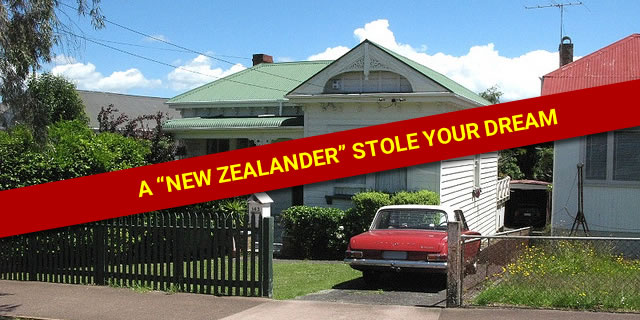The data published yesterday by Land Information NZ (LINZ) was far from perfect, but what it did contain give some indications of what is happening in our housing market. Foreign buyers – at least using the definition of non-tax residents – made up a paltry 3% of purchases.
There are plenty of ifs and buts – tax residency may not be a perfect fit with what we consider a ‘foreigner’ – and so numbers may shift over time. However, what is clear is that New Zealand tax resident investors are a major chunk of the purchasers. Taxes targeted at foreigners won’t work – we need to tax all housing if we want to fix the speculation problem.
The Numbers
First up, around 10% of the data isn’t available as the rules were being implemented while the transactions were going through. So lets discount those from the outset.
Of the remainder:
- 41% were exempt because they were buying their primary residence;
- 56% were New Zealand tax residents; and
- 3% were non-tax residents;
Foreign buyers were more active in the Auckland market – making up 4% of purchases there. The majority of those buying houses in Auckland (around 60%) were Chinese. But there is little else to point to hordes arriving on New Zealand’s shores.
One explanation is that the changes in rules have effectively put Chinese buyers off from buying in New Zealand. Whether this effect is permanent will be interesting to see.
Labour has critiqued the numbers for their incomplete nature, and there are definitely grey areas. On one hand the non-tax resident figure might be too high as it includes people that are New Zealand residents but living and paying tax overseas. On the other hand there could be recent migrants purchasing houses that are here on working or student visas. Under the rules these people are considered as tax residents, but many people might consider them ‘foreign buyers’.
LINZ included a survey question to try to tease this issue out, but they think people misunderstood the question because 35% of buyers responded as being in this category. This is a massive issue where we need to wait and see – it certainly seems odd that migrants on working and student visas would be buying such a large chunk of our homes. Presumably in the case of students the houses would be bought by their parents but put in their children’s names.
What can we conclude?
Thus far, while a few questions remain we have to conclude that there is no immediate problem caused by foreign buyers. In fact, what the media coverage has overlooked is that New Zealand tax resident investors are snapping up the lion’s share of houses.
This won’t be solved by a tax on foreign buyers. The only solution as we have pointed out many times is a comprehensive tax on housing. That is why we have proposed a Comprehensive Capital Income Tax, which taxes all assets as if they were a bank deposit. If you have an asset that isn’t giving you a financial return, this tax simply assumes you are getting some benefit – at least the same benefit you’d get from putting the money in the bank – and taxes you accordingly. That would close all our main tax loopholes – including owner occupied housing.
Why tax owner-occupied housing?
If owner-occupiers are being squeezed out by the investors, why tax everyone?
The fact is that exemptions like this make a fool of the tax system. As we have seen overseas, exemptions are exploited by the rich to avoid paying wealth and housing taxes. Any tax has to be simple to be enforceable. If you exempt the family home, the rich will make sure their family home is as big as possible. And while we are at it, surely a husband and wife need a family home each? What about the kids?
A simpler approach is to have minimum thresholds for individuals – any equity over that amount can be taxed. That would reduce administration costs and ensure that any comprehensive tax on housing was hugely progressive – in other words most people will be better off.

